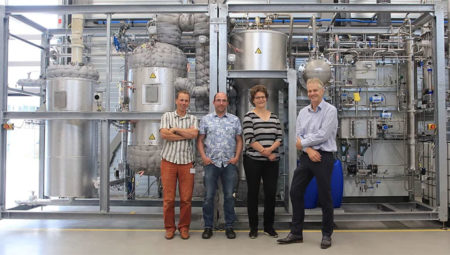‘We have already made the first pure biobased p-xylene, but also biobased benzene and biobased toluene,’ says Imhof. ‘But we didn’t give ot as much publicity.’ BioBTX makes these chemical building blocks as biobased drop-ins for the production of various plastics, in its pilot plant at the Zernike Advanced Processing facility (ZAP) in Groningen.
More flexibility
‘Our process is quite similar to that of Anellotech, but the difference is that we separate the two steps, pyrolysis and catalysis, which they perform in one reactor. In theory, it is cheaper to build only one reactor. But our process is much more flexible, in terms of feedstock and reaction conditions. Our process is also more robust. Technically, this means that our catalytic converter will last longer and therefore the variable costs can be reduced significantly. ‘
A big advantage of the BioBTX process is that it can handle multiple and even contaminated feedstocks. Imhof: ‘Anellotech can only run on pure wood and even that has to be pretreated to remove the contaminants.’ BioBTX can, in addition to wood, also process all kinds of liquid and solid biomass and even waste plastics.
‘In short, we believe that we have a better process because it is overall cheaper, more robust and more flexible. Anellotech has started earlier and is only one step ahead of us, but I’m convinced we will overtake them. Our proposition with waste plastics as a feedstock is economically as well as from a circular perspective, much more favorable. ‘



